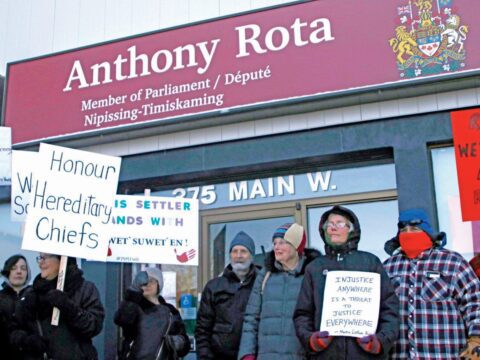On a particularly busy Sunday last fall, I was somewhat bitterly reflecting on how hard I work as a student minister to encourage my congregation to grow. I prepared for worship at 8 a.m., joined choir practice at 9, led the service at 10 and practised for the congregation’s performance of Godspell at 11:30. In the afternoon, I leafleted the neighbourhood to introduce myself and promote church events and then went to a community supper. Through all of this, I thought about my father, Rev. John Roberts, who was a United Church minister in Belgrave, Ont., during the 1970s and ’80s. “Dad didn’t have to do all this stuff,” I thought. “People just showed up — in droves!”
The membership of the United Church has been in fairly steady decline since the 1960s, along with mainline Protestant church membership in Canada in general. According to Statistics Canada, 41 percent of Canadians considered themselves Protestant in 1971. By 2011, only 27 percent did. In that same time period, United Church membership dropped from almost a million to just under 500,000 — and the church continues to lose members.
My congregation, like all United Church congregations, is worried about its future. But despite these gloomy statistics, some congregations within the United Church are growing — probably more of them than you think.
I’ve seen it happen. When I was in youth ministry in rural Ontario, we managed to grow the children’s congregation from six to 30 within three years. At Copetown (Ont.) United, my current congregation, we have increased attendance 25 percent over the past three years, bringing us to the highest numbers we’ve had since we un-amalgamated from another church in 2009. It took a lot of reflection about what it means to be church. It took a lot of intentional evangelism. And it took a lot of plain old-fashioned work.
I wondered how often my strategies would work. Could I make a template for how to grow a church that would be transferable to other communities of faith? When I was about to embark on a graduate research project as a fifth-year student at the Atlantic School of Theology last year, I decided to put my scholarly skills to the task of finding out. What I learned was surprising — and inspiring.
More on Broadview: When daughters follow their mothers into ministry
First, I had to find ministers of growing congregations to learn how they lead. I didn’t expect I would find very many, and neither did anyone else. When I told people I wanted to research this, the most common comment I heard was, “Well, that won’t take long!” But I went straight for the statistics. By comparing the most recent United Church Year Book with the one published five years before, I discovered that out of 1,934 pastoral charges, 306 had grown in average weekly attendance, for reasons other than amalgamation. That is 16 percent of churches! I took out congregations that had grown by less than five percent to avoid the normal fluctuations that come with births, marriages and relocations. I also eliminated congregations that grew by “silent amalgamation” after other churches in the area closed. That still left 273 congregations (14 percent) to consider. I sent a survey to these ministers about their experiences and strategies, and heard back from 24 leaders of growing congregations — making this the most comprehensive study of its kind to date within the United Church.
I discovered that, contrary to common opinion, growing churches were not always those that embraced a conservative theology. Two-thirds of respondents identified as theologically liberal, and the other third was split evenly between those who considered themselves conservative or who refused to commit. The respondents’ theology also didn’t seem to impact the amount by which their congregations grew. The more important factor was having a good fit between minister and congregation, to stabilize the church and encourage like-minded folks to attend.
The number-one strategy ministers — both conservative and liberal — used to grow their congregations was centring their worship on God, Christ and Spirit. This might seem surprising for those who imagine growth coming from outreach or new programs. Or it may seem obvious: isn’t that what churches were doing all along? Either way, it is an important reminder to celebrate our connection with the divine and each other in sacred community.
Rev. J.D. Kennedy, whose Nashwaaksis United in Fredericton grew 8.5 percent from 2012 to 2017, used to visit congregations as part of his role with Presbytery. “In those visits,” he says, people would say that “they were tired and dispirited. I would ask them why they wanted more people in the pews. I was hoping to hear of all the benefits the newcomers would experience spiritually, but what I would get back is that it would be easier to pay the bills, they wouldn’t have to work as hard at suppers, new voices in the choir….If the minister doesn’t know why they are a minister or what the church is here for, then they will have no foundation, no motivation and no direction for their ministry.”
When they do find that direction, it comes across in worship. It results in “preaching that takes scripture seriously, looks for both challenge and comfort, and aims both for the heart and intellect,” says Rev. Ryan Slifka of St. George’s United in Courtenay, B.C., which grew 23 percent over five years. Dynamic and uplifting worship can offer hope and prepare congregants for another week in a world that is too often anything but dynamic and uplifting — and motivate them to invite others to join them.
It took a lot of reflection about what it means to be church. It took a lot of intentional evangelism. And it took a lot of plain old-fashioned work.
Many ministers of growing congregations say that it’s important to make growth a priority and to be very intentional about it. This might involve counting attendance each week and reporting fluctuations to the congregation; planning retreats or town-hall meetings to talk about growth and strategize how to bring it about; reading books about evangelism strategies; or praying that those who need to belong to a church community will find a congregation that uplifts them.
Of course, it takes financial resources to build a congregation — to hire and fairly compensate the people putting in the hard work to do it — and small, struggling congregations often don’t have resources. But churches should prioritize ministry as much as their buildings, and many of these same congregations hold money in savings or investment for things like repairs. If the ministry is in need of repair, now may be the time to spend the money. The ministers I surveyed spoke of ways to bring in more revenue: stewardship campaigns, fundraising, social enterprise, applying for grant money — whatever it takes to help to stabilize the financial resources of the congregation, as long as those endeavours fit with the congregation’s vision.
To help get the word out about their church, many ministers say they need to be active in the communities in which they serve, especially if they live elsewhere. The minister’s presence can be felt by doing baptisms, weddings and funerals for anyone in the community, and by attending community events like sports, fall fairs or charity fundraisers. If it matters to the community, it should matter to the minister.
“On the first day of each quarter of the year, I walk every street in the neighbourhood surrounding the church building,” says Rev. Gord Dunbar of Kincardine (Ont.) United, which grew 15 percent. “[I’m making] notes about what I observe, looking for needs evident in what I see, looking for resources with which to make possible partnerships.” He reaches out to people who are part of community groups that have nothing to do with the congregation — like service clubs, the Legion, the hospital or the square dance club — and thanks them for their work in the community, opening the door to work together in the future. “It’s not about pews and hymns and committees,” he says. “It is mission.”

When the whole congregation is present within its community, the church can become a hub for activity — a place that serves not only its own needs, but those of the wider world as well. For instance, Slifka’s congregation in Courtenay, B.C., hosts a soup kitchen five days a week, where eight churches offer meals to people in need. They also give space to a food pantry and drop-in, and a library where families can borrow toys for their children. “The church is well-known in the community, and the congregation takes pride and ownership over our social ministries,” Slifka says. “People see the church walk the talk in practical ways.”
Other ministers shared ideas like entering floats in local parades; wearing T-shirts with the church logo at community events; having the choir or other church groups visit nursing homes and hospitals; and letting people know what is going on at the church through advertising, social media, a user-friendly website and flyers or door-hangers — or even going door to door to meet and greet the neighbours.
Other churches create events designed specifically to introduce new people to the church community. “Many of our fun groups within the church are open to all and not just United Church members,” says Pastor Brynn Carson of Porcupine (Ont.) United, which grew 46 percent over five years. This includes monthly card games, movie nights, a youth group and a single women’s luncheon. Members of the church’s weekly Alcoholics Anonymous group have told Carson that without the congregation’s openness, they would have nowhere else to meet. “Several of the members attend our church on different occasions and have thanked us by acting as work crews on some of our upgrades within and outside the church,” she says.
However the Spirit moves to bring people through the church doors, welcoming them appropriately is key, ministers say. This means having greeters at worship, and refreshments or potluck meals afterwards that accommodate different dietary needs, with vegetarian, gluten-free and nut-free options. Some identified being welcoming with being Affirming, or open to all regardless of age, race, class, ability or sexual identity.
In addition to encouraging new people to attend, it’s important never to lose connection with the ones already there. A major part of retention comes from good pastoral care, but good pastoral care can also facilitate growth by, for instance, supporting people who reconnect to the church after a crisis or loss.
“It’s not about pews and hymns and committees. It is mission.”
Throughout this whole process, being intentional about growth involves reflecting on and evaluating what is working and what is not. For some ministers, this happens at retreats and visioning sessions or through congregational surveys. Nashwaaksis United’s Kennedy has an especially interesting strategy. “In order to assess the church,” he says, “I had people come to the church as mystery worshippers. They had never been to the church before, so they could be honest and had fresh eyes, and I developed a questionnaire for them to fill out afterwards.”
Rev. Doug Moore, minister of Hamilton’s Laidlaw Memorial United, says that communication is not only about talking, but about listening. (His congregation grew 20 percent in five years.) Communities of faith need to pay attention to the feedback they are receiving and “listen carefully to the history of the place,” he says.
There were some words of warning from those leading growing churches. In addition to asking ministers for their experiences and strategies, I asked if there were congregations that could not grow. Despite the reluctance of the respondents to give up on any church, the overwhelming response was clear: churches with toxic internal power politics will not grow. This could take the form of a domineering board or individuals who cause conflict and dissent. A small number of ministers surveyed also expressed that they found it more valuable to focus on their congregations than to engage in the administrative work of the broader church. They said that social justice work must serve the Gospel and not vice versa.
It is worth noting that while all of these churches are growing, there is not a single strategy that all 24 respondents mentioned. No minister and no church can be all things to all people. But a general tone of faithful evangelism, optimism and determination underscored the responses. If churches want leaders who will help their congregations thrive, those are the qualities they should be looking for.
This is incredibly rewarding work. Many of the ministers talked about feeling joy and encouragement. They reflected on the transition from fearful, despairing congregations to congregations full of hope and abundance. “Each new person brings another way for us to encounter God’s presence,” says Andrea Wheaton, designated lay minister of Burton Avenue United in Barrie, Ont., which grew 58 percent. Of course, the ministers were pleased with the practical rewards of congregational growth — more people to share the workload, improved finances and so forth — but the primary focus was on the spiritual vitality of the congregation.
As I thought about the results of my research, I found myself reflecting more on my father’s ministry. The more I thought about it, the more I recognized how many of these things Dad did as a matter of course. For him, that was just good ministry. Within a week of each new family’s arrival in our community of Belgrave, Ont., Dad stopped by to welcome them. No pressure, just a warm hello and, “If you’d like to join us some Sunday, we’d be happy to see you.” He attended the local sports and cultural events and connected with everybody who was there, including — perhaps especially — those who never came to church. I remember complaining to him once that his sermons sometimes sounded as if he was preaching to people who weren’t there. He said, “Honey, evangelism is always part of preaching.” A dear friend recently told me that her parents called my dad in the middle of the night to babysit her while her mother was having a miscarriage. When somebody died, people called my dad before they called the funeral home, and they called him right after they called the ambulance during other emergencies. When he got these calls, he would always rush out to help, as long as my mother (who was a teacher) could take care of me and my sibling. If she couldn’t and he had to stay home, he would call around to find someone else to help. That’s what ministry was like in those days.
I believe that when United Church attendance began to decline, it began a trend of throwing our arms in the air and saying, “There is nothing we can do to stop this.” I believe ministers need to be the kind my father was — ministers for whom the “call” was a call on one’s life, not a call to a particular kind of work. I believe we need to change our narrative from one of providing pastoral care to dying congregations to one of offering encouragement and joy to people thirsting for it. We have Good News to tell. Let’s start telling it.
This story first appeared in Broadview’s June 2020 issue.
Broadview is an award-winning progressive Christian magazine, featuring stories about spirituality, justice and ethical living. For more of our content, subscribe to the magazine today.
















As a congregant, I want my leader to love God. I also want them to love me. We don’t want lip service either, we want to see you in action. You can screw up, but we want you to get right with God again. Reverend – a person who is revered.
Too often I see ministers starting off because they felt “called”. Through discouragement or rebellion, their ministry becomes a job, this is dangerous.
If I revere you, I want to emulate your Christ walk as well.
As a congregant, I want my fellow brothers and sisters of Christ to be “like-minded”. Not agreeing with everything I or you want, but how do we achieve together. This helps reaching those who are “lost”. If it’s “all about me”, we’re done.
Unfortunately our society wants financial resources to succeed. The early Church did this quite well, if we want something bad enough, we’ll “put up” for it. This causes tension, as we all have different resources. As a congregant I need to remember that ALL THINGS COME FROM GOD. What I have, God has blessed me with, I can’t compare my $100 to your $10. I also shouldn’t rely on the world to pay for the building of God’s Kingdom, it’s against their religion.
One word of caution, we are called to be salt and light to the world. We need to be careful that we don’t become part of the world. It’s hard to have outreach programs which later loses its original intent.
As ministers, you also need to remember to watch for pride. It isn’t the size of the congregation, it is the furtherance of the Gospel, and for the the Glory of God.
As a congregant, I need to pray for those who are mentioned in this article, and to those like-minded, who are called by God to reach a dying world.
Thanks to the author for the read, God is in control, and not all is lost.
Gary
Your response should be read aloud to all. I think you have it right from my perspective.
I believe the writer. The church needs full time ministers. Not one quarter of a half.
Ministering was a life vocation. The community knew who the minister was because he had a life presence in the community.
Is it better to have 4 struggling churches in a area or 1 large thriving???
Reg Bibby, the Lethbridge sociologist wrote a book called Fragmented Gods addressing this issue..Why the North American church is declining in numbers. After intensive research & non-partisan objective interviews with the general population, the basic jest / reason for this is the church is not relevant in people’s lives & does not make any significant difference in society.
Really care for the people & not just talk about it & you’ll probably see positive results.
PS: feel free to reply to me.
The reason people do not want to hear “Christianity” is because of pride and self centredness. We as Christians fail to effectively witness to non-believers because of our wanting to be “of the world” not just “in it”. Looking deep inside of ourselves Christians don’t want to love others as we love ourselves. In fact, some of us have a hard time loving ourselves.
Christians are called to be set apart, if we are no different than anyone else, why bother being a Christian? (Your point)
Instead of looking at our weaknesses as Christians, look at what we have to offer on the positive side. If we’re wrong no loss, if we’re right you have a lot to gain.
BTW a scientist cannot objectively look at Spiritual things. Spiritual things are intangible and cannot be quantified.
Just to set the record straight, growth in the Barrie church was due to the closure and sale of Central United Church and “sheep stealing” from other United Churches. I am thankful they found a new christian spiritual home, making new wine from old wine skins. We are looking forward to the increase in population in Barrie due to monolithic condominiums that are about to be built. I have been asking all 3 levels of government to clean up the underground toxic plume of pollution, that stretches from John Street under highway 400 to Kempenfelt Bay. The beautiful bay they are using as a selling point for the development of real estate in the downtown core. I pray and ask you for your gracious, Christ centered words for the safety and protection of “our sheep” and of our ground water, bay and lake Simcoe. In Christian love, Gillian MacLean.
Being relevant and timely, and the “presence” is the one most of our congregations really longs for. For me that presence is one of the key elements of church growth which I have observed here in my new pastoral charge of Hamiota United in Manitoba.
Caring indeed produces fruits, really good fruits!
Happy New Year from your folks here!